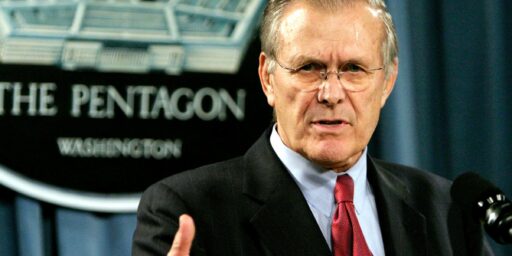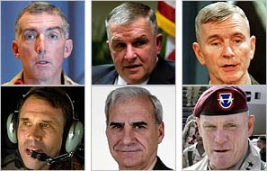Feith Assesses Progress
Washington Times — Pentagon Needs To Do ‘A Lot Better’ In Fighting Terror
The Pentagon’s top policy-maker says “we need to do a lot better” in combating the radical ideology of Islamist terrorists, but believes “we’re winning” the larger global war against terror. “If you’re going to put me to the wall, I’m going to say we’re winning because I think on balance we are making progress,” Douglas Feith, undersecretary of defense for policy, told The Washington Times yesterday.
***
Mr. Rumsfeld asked in one of his memos, dubbed “snowflakes,” to Mr. Feith, Deputy Defense Secretary Paul Wolfowitz and Gen. Richard B. Myers, Joint Chiefs chairman: “Are we winning or losing the global war on terror?” “Today,” the secretary wrote, “we lack metrics to know if we are winning or losing the global war on terror. Are we capturing, killing or deterring and dissuading more terrorists every day than the madrassas and the radical clerics are recruiting, training and deploying against us?” Some press reports portrayed the memo as Mr. Rumsfeld’s private doubts about the war. His aides said it was merely a classic Rumsfeld management technique used to provoke new thinking.
On the issue of metrics — developing a tool to measure the number of newly recruited terrorists versus those neutralized — Mr. Feith said such a number remains elusive. “I don’t think that he thought there’s a simple answer to the question,” said the policy chief, who worked as a junior staffer in the Pentagon during the Reagan administration. “He poses the question in a very straightforward fashion, but the answer — he understands that you can’t have a simple answer to a question as large as that. “I think it is fairly obvious it would be very hard to come up with a precise metric, because you don’t know who’s going to be a suicide bomber, for example, or for that matter just a terrorist murderer.” One way to begin to develop some type of metric, he said, is to monitor the Muslim press and statements by terror leaders, as well as counting those killed or captured. “I think we need to do a lot better work on metrics,” he said.
***
Mr. Feith said the Pentagon has settled on three strategies for winning the war: disrupting or destroying terror cells, homeland defense, and countering ideological support for terrorism. It is this third component that is proving elusive. “I think this ‘countering ideological support’ area is an area where a whole lot more work needs to be done by the entire government and the private sector,” he said. He said the West needs to help the Muslim world offer education alternatives to the mosques and madrassas that teach a hate-filled version of Islam. An example is President Bush’s pledge of $600 million in annual aid to ally Pakistan, which will use some of the money to create schools with more moderate teachings.
Mr. Rumsfeld also had asked whether the government needed a new institution to handle war issues. Said Mr. Feith, “We may need many new institutions.” He said the administration is likely to create a standing task force of various agencies that would handle the emergency deployment of troops to hot spots such as Liberia and Haiti. Today, such task forces are set up on an ad hoc basis, which consumes valuable time.
I’m not sure how effective re-education will be but it makes sense to try. Certainly, $600 million would be cheap in the context of our national security budget. It would be rather ironic if an administration constantly chastised for only seeking a military solution to this problem wound up finding a way to get at the “root causes” of terrorism.




